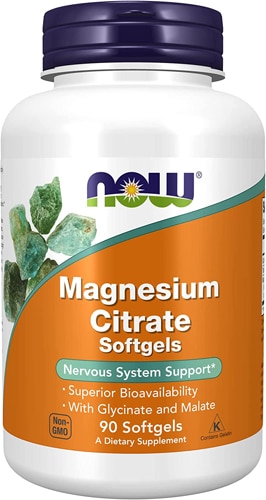[vc_row][vc_column][vc_column_text]Magnesium is an essential mineral found in a variety of foods, but as many as
50 percent of Americans do not consume enough of it in their daily lives.
† While true magnesium deficiency is uncommon, it’s still important to ensure you don’t miss out on the wellness benefits from consuming enough of this key nutrient.
 Magnesium contributes to more than 300 biochemical and metabolic functions in the human body
Magnesium contributes to more than 300 biochemical and metabolic functions in the human body, including:
- Nerve control
- Energy production
- Bone growth
- Protein synthesis
- Blood pressure regulation
That’s just naming a few of the ways magnesium supports your body. When it comes to your fitness journey, magnesium is also important because it can promote efficient muscle recovery after exercise.
†
Here’s what you need to know about incorporating magnesium into your post-workout routine. Plus, find out which foods to consume to support your magnesium intake.
Magnesium for Muscles: Its Role in Recovery & Fitness
Magnesium plays several roles in how your muscles perform during exercise and how well they recover afterward, according to the Nutrients Journal. For example, it helps the body metabolize glucose (the main source of energy the muscles use to sustain physical exertion), and it supports maximal oxygen uptake to increase muscular and aerobic endurance levels.
†
Muscle functioning and magnesium
You might spend time working on your form so you can get the most from your workout. The better your form, the more efficient you are. While this is important, magnesium can also play a role in how your muscles perform and work together. In fact, there’s a correlation between magnesium and the optimal functionality of certain muscle groups, suggests Nutrients Journal.
† Here are a few examples:
- Knee and ankle extension torque†
- Isometric trunk flexion and rotation†
- Increased jumping performance†
Post-workout recovery and magnesium
It’s so important to rest, hydrate and fuel properly after each workout. But—you may also want to consider magnesium as another tool for supporting your muscles. This mineral reduces lactate accumulation in your bloodstream, which delays the onset of muscular fatigue and can even help support tissue repair, according to the Nutrients Journal.
†
Not to mention, magnesium assists with protein synthesis, allowing the muscles to transition from a contraction state while you’re moving into relaxation once you finish.
†
Reduced muscle inflammation and magnesium
The European Journal of Applied Physiology reported that
magnesium supports a healthy inflammatory response, which can alleviate muscle soreness after acute bouts of strenuous or intense physical activities. If you want to kick that painful walk up the stairs after leg day, magnesium could be worth considering.
†
How Much Magnesium Is Enough
It’s also worth noting that many athletes and frequent exercisers have a 10 to 20 percent higher need for magnesium consumption because the body loses this nutrient through sweat, the European Journal indicates. So if you work out on a regular basis, consider your own magnesium intake and whether you need to integrate more into your diet.
According to the
National Institutes of Health, most adult men, between the ages of 19 and 50, require 400 to 420 mg of this nutrient per day, while most adult women in the same age bracket require 310 to 320 mg per day.
The exception is pregnant women, who need about 350 to 360 mg per day. However, if your magnesium intake drops below these optimal levels, you could start to notice some of
the following symptoms over time:
- Physical weakness
- Loss of appetite
- Chronic fatigue
- Nausea or vomiting
- Muscle cramps
- Numbness or tingles
- Abnormal heart rhythms
- Coronary spasms
- Frequent migraines
- Depression or anxiety
- Low immune function
Fortunately, inadequate magnesium is a simple issue to resolve. Many staple foods contain this mineral naturally, so even if you follow a plant-based regimen, there are all sorts of nutritious and accessible options to choose from.
How to Eat More Magnesium
The most abundant sources of magnesium tend to be leafy greens,
nuts,
seeds,
beans, oats and whole grains. Here’s a list of common
magnesium-containing foods that you can incorporate into your post-workout routine for muscle recovery:
- Pumpkin seeds: 168 mg per serving
- Almonds: 80 mg per serving
- Spinach: 78 mg per serving
- Cashews: 74 mg per serving
- Peanuts: 63 mg per serving
- Soy milk: 61 mg per serving
- Black beans: 60 mg per serving
- Edamame: 50 mg per serving
- Dark chocolate: 50 mg per serving
- Peanut butter: 49 mg per serving
- Whole wheat bread: 46 mg per serving
- Avocado: 44 mg per serving
- Potato: 43 mg per serving
- Brown rice: 42 mg per serving
- Yogurt: 42 mg per serving
- Fortified cereal: 40 mg per serving
- Oatmeal: 36 mg per serving
- Kidney beans: 35 mg per serving
- Bananas: 32 mg per serving
- Salmon: 26 mg per serving
- Dairy milk: 24–27 mg per serving
- Halibut: 24 mg per serving
- Raisins: 23 mg per serving
- Chicken: 22 mg per serving
- Ground beef: 20 mg per serving
- Broccoli: 12 mg per serving
- Apples: 9 mg per serving
- Carrots: 7 mg per serving
While there are plenty of ways to eat all of these foods—and you probably have a few ideas in mind already—here are a couple of good recipes you can use to capitalize on these foods after your workout:
Don’t Forget Magnesium
Don’t overlook the importance of magnesium, in addition to stretching, fueling your body and rehydrating after a workout. This mineral can support muscular strength and endurance, support protein synthesis and tissue repair, and relieve soreness, inflammation or fatigue.
† The next time you reach for some post-workout fuel, be sure it’s also rich in magnesium.
†These statements have not been approved by the Food and Drug Administration. These products are not intended to diagnose, treat, cure or prevent disease.[/vc_column_text][/vc_column][/vc_row][vc_row][vc_column][vc_text_separator title="Featured Products" border_width="2"][vc_row_inner equal_height="yes" content_placement="middle" gap="35"][vc_column_inner width="1/3"][vc_single_image image="171139" img_size="full" alignment="center" onclick="custom_link" img_link_target="_blank" css=".vc_custom_1702268163545{padding-right: 7% !important;padding-left: 7% !important;}" link="https://www.vitacost.com/garden-of-life-sport-organic-post-workout-plant-based-recovery"][/vc_column_inner][vc_column_inner width="1/3"][vc_single_image image="171141" img_size="full" alignment="center" onclick="custom_link" img_link_target="_blank" css=".vc_custom_1702268182885{padding-right: 7% !important;padding-left: 7% !important;}" link="https://www.vitacost.com/vitacost-magnesium-500-mg-180-capsules-3"][/vc_column_inner][vc_column_inner width="1/3"][vc_single_image image="171140" img_size="full" alignment="center" onclick="custom_link" img_link_target="_blank" css=".vc_custom_1702268218776{padding-right: 7% !important;padding-left: 7% !important;}" link="https://www.vitacost.com/twinlab-magnesium-caps"][/vc_column_inner][/vc_row_inner][/vc_column][/vc_row]
 Magnesium contributes to more than 300 biochemical and metabolic functions in the human body, including:
Magnesium contributes to more than 300 biochemical and metabolic functions in the human body, including:



